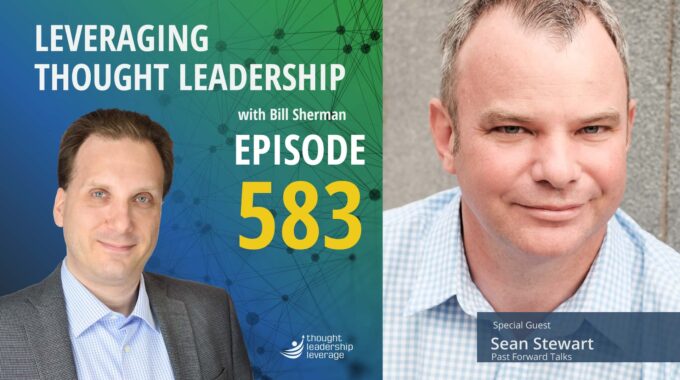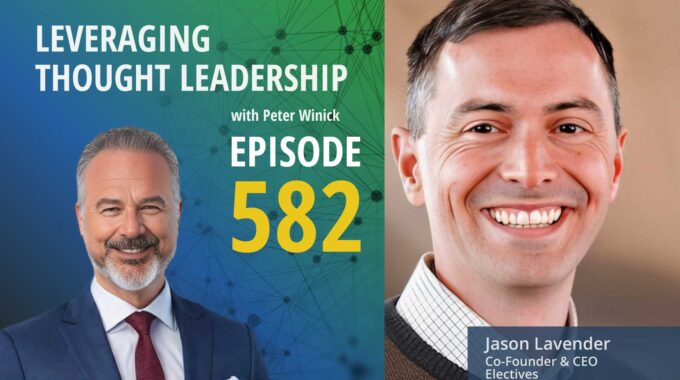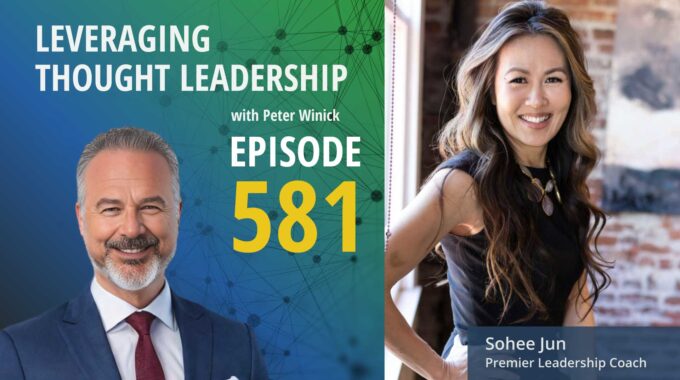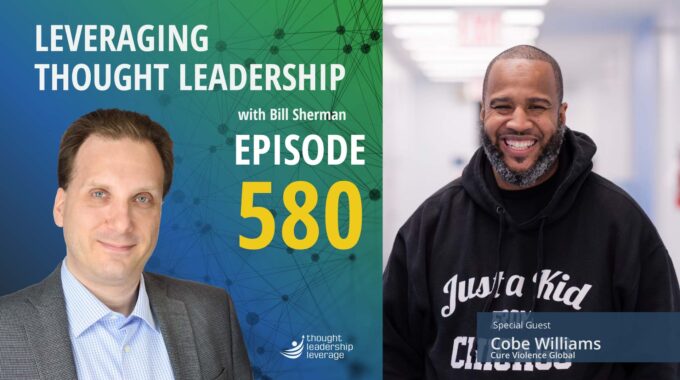Turning Everyday Objects into Tools for Effective Leadership A conversation with Sean Stewart on how…
Pioneering Preventive Medicine | Dr. Helen Messier
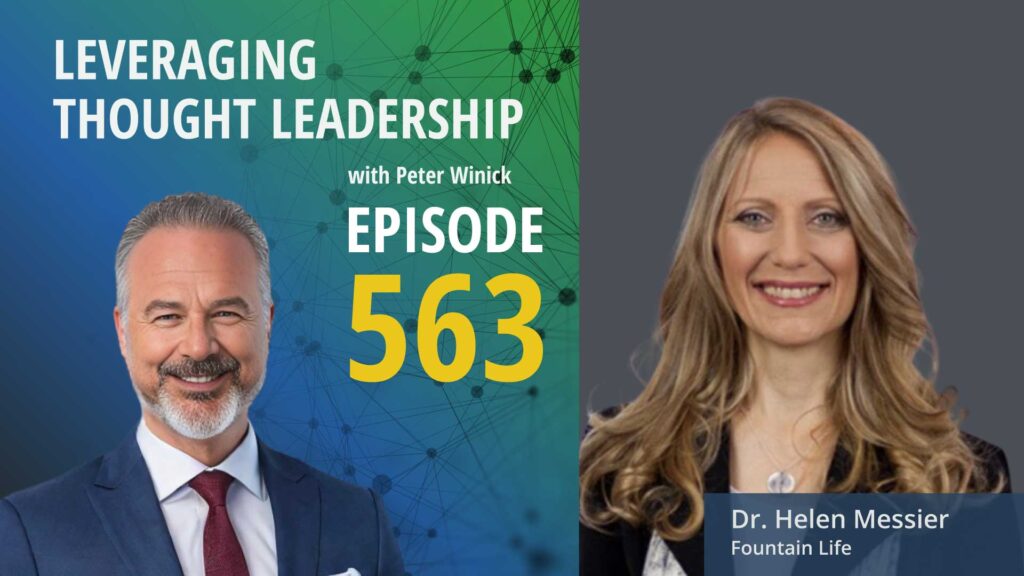
Strategies for Shaping the Future of Healthcare
A conversation with Dr. Helen Messier about what it takes to change the perspective on healthcare from reactive to proactive.
Join us for an enlightening conversation on the latest episode of Leveraging Thought Leadership with esteemed guest Dr. Helen Mesier, a trailblazer in the field of translational medicine. Dr. Mesier shares her remarkable journey from a childhood dream of becoming a family doctor to her current role at Fountain Life, where she is pioneering groundbreaking approaches to healthcare.
During our discussion, Dr. Mesier candidly reveals the challenges she encountered in bridging the gap between scientific research and clinical practice. With a deep commitment to applying cutting-edge science to patient care, she recognized the critical need for more proactive and preventive measures in addressing the rising tide of chronic diseases. This realization led her to Fountain Life, where she is leading efforts to shift the conversation around medicine from reactive treatment to proactive prevention.
At Fountain Life, Dr. Mesier and her team are revolutionizing healthcare by adopting a proactive approach to screening and preventive care, even in asymptomatic individuals. By challenging traditional healthcare paradigms and leveraging innovative strategies, they aim to empower individuals to take control of their health and well-being.
Throughout our conversation, Dr. Mesier shares valuable insights into the importance of collaboration and thought leadership in driving meaningful change in healthcare. From engaging policymakers and industry stakeholders to collaborating with fellow thought leaders, she emphasizes the power of collective action in advancing the field of medicine.
Tune in to this thought-provoking episode as Dr. Helen Mesier shares her expertise and vision for the future of healthcare. Whether you’re a healthcare professional, thought leader, or executive, you won’t want to miss this insightful discussion on the evolving landscape of medicine and the critical role of proactive healthcare in shaping a healthier future for all.
Three Key Takeaways:
- Proactive Healthcare: Dr. Mesier emphasizes the importance of shifting the healthcare paradigm from reactive treatment to proactive prevention. By implementing proactive screening and preventive measures, individuals can take control of their health and address potential health risks before they escalate into chronic diseases.
- Collaborative Approach: Collaboration is essential in driving meaningful change in healthcare. Dr. Mesier highlights the power of collective action, whether through engaging policymakers, collaborating with industry stakeholders, or partnering with fellow thought leaders. By working together, healthcare professionals can leverage their collective expertise to advance the field and improve patient outcomes.
- Evidence-Based Practice: Dr. Mesier underscores the importance of evidence-based practice in healthcare. From conducting rigorous research to publishing peer-reviewed articles, she emphasizes the need to substantiate innovative approaches with scientific evidence. By demonstrating efficacy and credibility, healthcare professionals can garner support for new initiatives and inspire confidence among patients and stakeholders.
If you want your content to reach your primary audience but are struggling to identify them reach out to Peter Winick to discuss getting help developing an editorial plan that will bring your best ideas to those who can have the most impact!
Transcript
Peter Winick And welcome, welcome, welcome. This is Peter Winick. I’m the founder and CEO at Thought Leadership Leverage. And you’re joining us on the podcast, which is Leveraging Thought Leadership. Today my guest is Doctor Helen Messier, and that’s Doctor Twice, meaning PhD and MD.
Dr. Helen Messier So we call it Doctor Squared. Yeah.
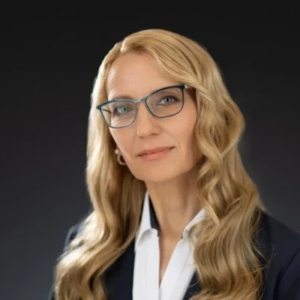
Peter Winick Doctor squared. Yeah. So, she’s a PhD and an MD primarily in the translational medical space. And we’ll dive into her work as opposed to her bio because that would take us a long time. So welcome aboard today doctor doctor.
Dr. Helen Messier Thank you. Lovely to be here with you, Peter.
Peter Winick Great! So, give me, let me start with, from a thought leadership standpoint, how the heck did you get here? Because this is typically not linear or planned or no nine-year-old girl dreams of being this. I would imagine.
Dr. Helen Messier That is true. You know, I did dream of being a doctor to some degree, but at that point my concept of a doctor was, you know, a small-town family med doctor, which I was used to and seeing. But, you know, I think, I think when I went through school, I got very interested in the science. And so, did you know, did the science kind of research way looking in molecular immunology got deep into the research but then thought, what am I going to do with this crazy amount of knowledge? I want to apply it. I want to be able to make use of it. So went into medicine. So, with the idea of, wow, all of this amazing stuff that I’ve discovered published on learned in the scientific world, I want to apply that to people. And I thought, of course we do that in medicine. But when you got out in medicine and I got into practice, I realized that, you know, pretty much 80% of the people I saw had chronic disease. And the tools that I had that I learned in med school were not enough. We actually never did learn how to apply that scientific, you know, really our real understanding and what’s published in the scientific literature, very rarely did we actually get to apply that to our, our patients. And, and we’re not taught that in med school. So really just got the, you know, I saw this chronic disease, I saw these hard cases. And I went back and I started reading the literature and went, wow, there’s so much information here that if we were able to apply this, we can make a difference. So, I started doing that and it actually starts working. And so, you know, 20 years ago, before things like the microbiome became very popular. Those were all in the literature. We are. We had really good understanding of it, but it never made it into medical practice. So, I really have spent my career in what I call this translational medicine. As you mentioned in the intro to this space where, you know, instead of typically scientific discoveries on average take about 15 to 20 years to actually make it into clinical practice, if that. And so, we now like what we’re doing is, is really making that happen in much more real time and helping a lot of people in the process.
Peter Winick And when you say we so broaden that to the current thought leadership and the business businesses that you’re involved in, that solve that gap, that solve that. Yeah.
Dr. Helen Messier Yeah. Exactly. So thank you. I’ve been involved in lots of different businesses. You know, how do we actually apply this concierge medicine? I’ve founded a number of concierge medicine practices. Currently I’m at a company called Fountain Life. And at Fountain Life, what we are doing is, is really trying to leverage this it changes the conversation around medicine. Actually, if you think about it, when do you go see a doctor? You see a doctor.
Peter Winick It really is.
Dr. Helen Messier Great when you when you’re feeling unwell, when you have symptoms. But if we wait until symptoms, you know, when we have symptoms, you’re going to be very late stage in most diseases. So we absolutely in order to actually even save our economy right. With, with chronic disease becoming it’s an epidemic with our aging population as it is now. And we know that aging is the biggest risk factor for chronic disease. If we don’t do something about it now, we’re going to bankrupt our whole society. And we see this already.
Peter Winick When we say when you say we. I think this is important for all thought leaders to think about. Who are the we’s that you’re talking about?

Dr. Helen Messier Yeah. I mean, we in general as a society I think is one big one. But we, you know, here at Fountain Life as well. I think the idea is as a thought leader, you have to make it easy for people to do this right. You see that? You see where it’s going. So at Fountain Life we’re being very proactive, preventive. We’re actually screening and looking deep at asymptomatic people. That’s never been done before. Right. The idea of oh my gosh, why would you why would you do a test on someone that doesn’t have symptoms.
Peter Winick Go back where to happen step because health and medicine, you know, one of the one of the many problems is everybody’s got a got a horse in the race. Right. I want to be healthy. I’m not an MD. I’m not in the business, whatever. But I’d like to be healthy. I’d like to live longer. Like those would be good things. Right. So, is your thought leadership focused on me? Is it focused on general practitioner, doctors, health? And like, who are the constituents that you’re trying to influence the most with this message of this closing of the gap?
Dr. Helen Messier Yeah, I think I think it’s a health care in general, you know, but in order as you sort of said, there’s so many stakeholders in health care as we have it right now. There’s a lot of money from insurance and pharmacy and, and there’s so much involved. So we have to take that and get that kind of create a parallel system, so to speak, and prove. So, the idea is having to prove that this works, show that you can save money, show that you can prevent disease. And we do that to policymakers. Right. So, you know, from a political perspective, we do that to the general public as a grassroots and then also to other people in the medical field being other physicians. And so I teach our approach to other physicians as well. So.
Peter Winick On the teaching to other physician. So let’s stay there is that’s one important population to get this these ideas to other physicians. Now, there’s lots of ways that you can choose to go about that. You could say, hey, I’m going to have five phone calls a day with doctors and talk to them. Not particularly efficient. You could write articles, you can write books. You do deliver keynotes. How do you decide how to and where to deploy the message and the messages?
Dr. Helen Messier Yeah. So I think it starts with, you know, I think deploying it in talks. So I speak at a lot of conferences, I think, you know, that already attracts certain open-minded physicians. I would say, I think publishing our findings and results and outcomes is really critical, because to have credibility in the scientific medical world, you do need to publish and through peer reviewed articles and journals. I think that’s really important. And showing in those publishing, showing the outcomes, I think, I think the key is proving that it works. And so being able to, you know, where do you get it? I think writing is important. Publishing is important, speaking is important. And then just teaching courses and then hiring physicians to work in our centers and training them on this approach to and then that starts to get out, you know, because as a physician, as a thought leader, you can, you know, like you said, talk to one person at a time, one patient at a time. That’s not going to get the message out there. It’s going to help those people, which is wonderful. But what.
Peter Winick You can.
Dr. Helen Messier Do is, is influence the influencers as well. So you now can get the people that you know, you get the politicians, you get the movie stars, you get the, you know, their high-net-worth people. But they have a lot of influence in our society. And when they can personally experience what it’s like to actually optimize their health, prevent disease, then we now create this kind of voice that they can influence the other people in society, because they also have a lot of followers. So, so influencing there’s I think is one of the best ways to expand that those through.
Peter Winick If you’re enjoying this episode of Leveraging Thought Leadership, please make sure to subscribe. If you’d like to help spread the word about our podcast, please leave a five-star review at ratethispodcast.com/ltl and share it with your friends. We’re available on Apple Podcasts and on all major listening apps as well as at thought leadership leverage.com/podcast.
Peter Winick Two thoughts that come from that one would be the select criteria, right? There’s only so many days in the week and so many flights that you want to take. Correct. So if you’re invited to ten conferences in a particular month and two criteria that you use, whether it’s a conference or would it be published or whatever. And then on the flip side of that, what are the metrics that you use for any vehicle that you put out in any format to say, yeah, that’s a good way to measure if that the efficacy was there?
Dr. Helen Messier Yeah, yeah. So, I mean, I think from conferences perspective, you do look at number of attendees, you look at other speakers who are there. You know, I think it’s important to maintain credibility. That’s critical. You know, you have to stay in that group of very credible people. So that’s important. And then measuring it, I think the I think the key, you know, you can do things like number of views, you can do things. I think that’s but ultimately, it’s kind of like you and I talking now you have a lot of followers on your podcast. We start to get messages out by doing podcasts and other types of webinars and YouTube things as well, in addition to the conferences. And then of course, not just looking at number of followers, but types of followers. I think that’s really important right now.
Peter Winick It gets hard, right? Because not all people are created equal right? Equal. Right. So, there might be a choice that you make to go. Here’s a podcast that’s got 10,000 mommy bloggers or whatever. And here’s another one that’s got 200 people, but they’re really, really critically important because there may be deans of medical universities that buy their position. Right. So, you have to I think it’s easy to fall into the lazy numbers of how many zeroes is better versus the quality. Not that one is better than another, but it’s better relative to your purpose.
Dr. Helen Messier Depending on who you’re trying to reach. That’s 100% right. And I think it’s you know, it’s much better to get that, you know, 10,000 people, that or 200 people, whatever that number is of influential, impactful people. Yeah. Hurts is the a million of people that are interested in the message but may not have any ability to affect it. Now, there is value in grassroots demand for things, but I think that comes next.
Peter Winick Got it. Yeah. Yeah. Interesting. Cool. What are the things that you think about in terms of collaborating. Right. Because oftentimes what happens as thought leaders is it’s easy to make it a solo sport, right. And say, hey, I am going to research, I am going to and there’s a lot is a lot of burden, responsibility, work, effort and energy. What have you done that’s collaborative meaning? Oh, you know what? I should put my chocolate with the peanut butter of this person. And together we could write an article or do something like that. Have you done much of that?
Dr. Helen Messier Yeah, absolutely. I think I think all of it. Nothing can be done alone, you know, especially in the in the medical scientific world, IT research is critical. Showing outcomes is critical. None of that can be done by yourself. So even when you when you publish having coauthors that also have credibility, they help you get into write better journals. I think that’s important. And you know, also thought leadership I think is critical. But I think, you know, that the sort of the power of the collective mind is even more than the individual mind. And I think that when you get a bunch of thought leaders together that you create much more. It goes much farther than a thought leader all by themselves.
Peter Winick Yeah. And I also have found in my experience that when. A thought leader or an aspiring thought leader, reaches out to another thought leader and says, hey, I admire your work, I’ve been reading your stuff for a long time, etc. and here’s what I’m doing. Would love to get your feedback, your thoughts, your insight. People want to help people, particularly when there’s a resonance or an alignment. Or it might just be, I like you, that’s fine. But more importantly, there’s this sort of unspoken mission that we’re all trying to achieve. And when I say, like, wow, what you’re doing is really cool. How can I how can I be of assistance to that? How can I support that? And there is a bit of the greater good going on with that.
Dr. Helen Messier Absolutely, absolutely. And there’s a synergy even in the thoughts. Right. There’s the greater good helping each other achieve their own individual purposes. But then there’s also the creation of a new ideas. And new purpose is when you start to collaborate. Because, you know, a lot of my best ideas come from when I’m talking to people, right? When I’m trying to share and get my ideas out there. I get a lot of new ideas just in, you know, the way people ask questions and, and they’re interested in just throwing out different ideas. So a lot of the there’s not a lot of like absolutely brand new thought. It’s the connection of disparate ideas and how you can connect them together that, you know, is the new is the.
Peter Winick And I think that’s the thread of thought leadership that people don’t utilize as much for this purpose. But it’s great to develop relationships, right? You know, it’s a great way to say, hey, I’m working on this problem. I know you’re working on the same problem. Can we talk a little bit like, yeah, that’s an immediate warm relationship versus a cold call of can you do this for me? Right. Like it’s just different. And then it’s fairly frequent. Then someone will say, hey, Helen, you know, this was really fun. You were a great guest here. There’s five other docs that I’ve interviewed on the podcast. Go take a look and I’d be happy to make introductions to them. It’s like, great, no brainer. Like, I’m not a doc, but I’m on the team and doing what little bit I might be able to do to be of assistance to you and your mission.
Dr. Helen Messier Yeah. Absolutely. Right. And I think that’s where you create the magic is in those connections and in bringing these likeminded people together. Because over and over again, once you have this group and you know, I like this too. One of the things I’ve been working on is this concept of, you know, a physician, you’re going to get very different, I think, results and experience depending on what physician you go to, because we’re not all the same. Yes, we all go through med school and our med school is very similar. But what happens after that? Every person learns from the experience that they’ve had. Right. But I have experience of patients. I’ve seen in other things that the next physician next door doesn’t have. Now, imagine if we could combine the learning from all those experiences together. That would be amazing. And so the other the other idea is, can we start to leverage the power of technology to bring all of these together and create the combined thought, so to speak, that are really going to change the world? And then no matter what physician you go to, you’re going to get the best care possible.
Peter Winick Exactly. Well, this has been great. I appreciate your time. I appreciate your insights. And thank you for joining us today. I appreciate this, Helen. Thank you.
Dr. Helen Messier Thank you. It’s been a lot of fun.
Peter Winick To learn more about Thought Leadership Leverage, please visit our website at ThoughtLeadershipLeverage.com to reach me directly. Feel free to email me at Peter at ThoughtLeadershipLeverage.com, and please subscribe to Leveraging Thought Leadership on iTunes or your favorite podcast app to get your weekly episode automatically.


